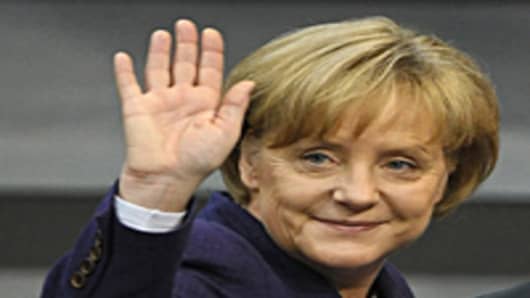One of the parties underpinning Angela Merkel’s coalition has threatened to topple the government should the chancellor agree to give troubled euro zone countries emergency loans without rigorous conditions concerning budget reforms, the Financial Times reports.
Horst Seehofer, leader of the Bavarian sister-party of Ms Merkel’s conservative Christian Democrats, warned that softening the conditions for funds would “at some point lead to the situation” in which his Christian Social Union could no longer support eurozone aid.
“And without the CSU, the coalition has no majority,” Mr Seehofer said.
The chancellor has come under pressure at home after Spain and Italy claimed at last week’s European summit that Germany had softened its position on fiscal rigour to better help them recapitalise banks and push down sovereign bond yields.
Ms Merkel has contested these “misunderstandings” and pledged “strict conditions” for any future capital injections for eurozone banks and sovereign bond purchases by the euro zone rescue fund. But her words to the German parliament late on Friday apparently failed to soothe Mr Seehofer, also state premier of Bavaria.
He told Stern magazine in an interview that it was hard for voters to understand how Ms Merkel could have asked the Bundestag to approve the new European Stability Mechanism on Friday while “at exactly that moment leaders of some euro governments were working towards weakening its very own stability criteria”.
Giving notice that the CSU, long critical of eurozone bailouts, would scrutinise the final details of last week’s deals, Mr Seehofer said: “We trust the words of the chancellor: even in future there won’t be any aid without strict conditions and reform requirements.”
New pressure at home threatens to complicate Ms Merkel’s talks with euro zone partners.
Perceived as having given in to a fiscally lax grouping led by François Hollande, France’s recently elected president, she could become wary of any new compromises that could be construed as posing a danger to Germany’s fiscal rectitude.
Ms Merkel said on Tuesday that she had discussed the summit results with Mr Seehofer and that he agreed European solidarity was as important as budgetary restraint. She said the coalition, which includes the liberal Free Democrats as its other partner, would continue to “co-operate well” in areas of European policy.
Meanwhile, the Finnish government continued to unpick parts of last week’s summit deal, issuing a statement on Tuesday that it opposed using the eurozone’s new 500 billion euro ($629 billino) rescue fund to purchase Italian or Spanish bonds on the open market.
Given the ESM’s limited resources and the need for large bond purchases to cut Spanish and Italian bond yields, Finnish officials said, secondary market purchases would be counterproductive by depleting scarce resources with limited impact.
This angered EU officials, who said such purchases were openly considered and agreed to for countries in trouble at the summit. All eurozone members had agreed intervention would come with only limited conditions on the country being assisted.
Instead of open market purchases, Finland has urged intervention only to purchase bonds at auction, where less money would have to be spent and the cash would go directly to struggling governments. Finnish officials have said the Netherlands has a similar position, but the Dutch have distanced themselves from this suggestion.


